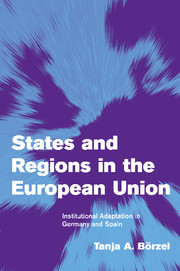Book contents
- Frontmatter
- Contents
- List of figures
- List of tables
- Acknowledgements
- List of abbreviations
- Introduction
- Part I Europeanization and domestic institutional change: A historical institutionalist approach
- Part II Reinforcing cooperative federalism: Institutional adaptation to Europeanization in Germany
- Part III Transforming competitive regionalism: Institutional adaptation to Europeanization in Spain
- Part IV Sharing versus shifting the costs of adaptation: The Europeanization of environmental policy-making in Germany and Spain
- 10 The “blooming” of cooperative federalism: Institutional adaptation to the Europeanization of environmental policy-making in Germany
- 11 The “greening” of competitive regionalism: Institutional adaptation to the Europeanization of environmental policy-making in Spain
- 12 Conclusion
- Conclusions: Toward convergence in Europe?
- Appendix: The major EU environmental policies of the policy study
- List of references
- Index
11 - The “greening” of competitive regionalism: Institutional adaptation to the Europeanization of environmental policy-making in Spain
Published online by Cambridge University Press: 22 September 2009
- Frontmatter
- Contents
- List of figures
- List of tables
- Acknowledgements
- List of abbreviations
- Introduction
- Part I Europeanization and domestic institutional change: A historical institutionalist approach
- Part II Reinforcing cooperative federalism: Institutional adaptation to Europeanization in Germany
- Part III Transforming competitive regionalism: Institutional adaptation to Europeanization in Spain
- Part IV Sharing versus shifting the costs of adaptation: The Europeanization of environmental policy-making in Germany and Spain
- 10 The “blooming” of cooperative federalism: Institutional adaptation to the Europeanization of environmental policy-making in Germany
- 11 The “greening” of competitive regionalism: Institutional adaptation to the Europeanization of environmental policy-making in Spain
- 12 Conclusion
- Conclusions: Toward convergence in Europe?
- Appendix: The major EU environmental policies of the policy study
- List of references
- Index
Summary
The uneven distribution of “say and pay” in European environmental policy-making
The centralization of environmental competencies at the national level
As in Germany, the central state and the CCAA share responsibility for environmental policy-making. Sharing competencies, however, does not result in joint decision-making. Rather, the central state sets legislación básica (framework legislation) in order to provide a “lowest common denominator” of environmental standards throughout the country. The CCAA have the responsibility of implementing framework legislation. They may also enact additional norms, which complete or reinforce the regulations of national framework legislation, e.g. by setting stricter standards (Art. 149.23; 148.9 CE). The problem is that the CCAA do not always equally invoke their competence to develop central-state legislation. Some CCAA enact additional regulations, which go beyond the central-state legislation, while others simply apply the national laws. This tends to result in an uneven implementation at the regional level, which is reinforced by the lack of intergovernmental cooperation. Unlike Germany, where the Länder participate in central-state decision-making, intergovernmental coordination and cooperation used to be weak to non-existing in Spain. Consequently, the CCAA had no co-decision powers to lose as a result of Europeanization. Rather, centralization proceeded through the central state “capturing” legal and administrative competencies of the CCAA in the implementation of European environmental policies. The Spanish government managed to intervene in the transposition of virtually all European environmental policies by drawing on its exclusive competence to set and develop framework legislation.
- Type
- Chapter
- Information
- States and Regions in the European UnionInstitutional Adaptation in Germany and Spain, pp. 178 - 208Publisher: Cambridge University PressPrint publication year: 2001

